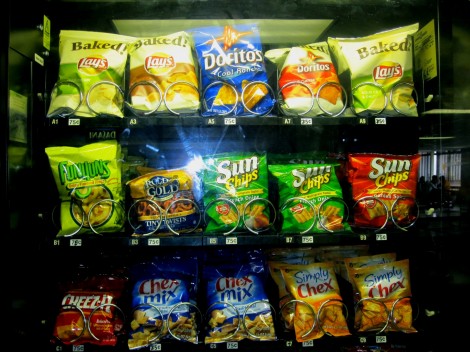
In the near future, Wayland High School may be swapping all of its sugary beverages and high-fat snack foods for other, healthier alternatives. In 2008, nearly a third of Massachusetts youths were obese or overweight, as were more than half of Bay State adults. Prodded by this increasing childhood obesity, the State Senate has unanimously passed legislation that will ban the sale of junk food in school vending machines and snack bars.
The bill calls for nutritional standards to be put in place for food that is sold in school vending machines and snack bars during the school day. More specifically, it endorses the sale of nonfat and low-fat dairy products, fruits and vegetables, whole grains, and other healthier options, while barring the sale of “junk food” such as chips, candy, and other foods typically perceived as unhealthy.
The regulations would extend to beverages as well, promoting non-sweetened water, 100 percent fruit juices, and drinks with no additives or carbonation, in place of their sugar-laced counterparts.
The bill will only affect food sold at school during school hours. Snacks sold after school and bake sales will not be affected.
Reaction to the legislation at Wayland High School was mixed. Some students believe that the ban would do little to reduce childhood obesity. “I feel like it wouldn’t make much of a difference,” said junior JoAnna Hermanns. “We can just go and get unhealthy food the night before and bring it to school.”
Senior Merritt Elmasri is of the same opinion. “I think it’s a terrible idea,” he said. “It’s the person’s choice what food to get from the vending machine.”
[adrotate group=”2″]
Freshman Olivia Shaw disagrees. “I think it’s a good idea because teenagers don’t often take into account the fact that if they eat too much junk food it could hurt them in the long run.”
According to Food Service Director Cheryl Judd, Wayland is already well on its way to meeting all of the proposed guidelines of the junk food ban. “I’m not too concerned about meeting the guidelines,” she said. “Wayland is close to what they’re asking for.”
Many nutritional changes have already been made in the school district. All Wayland schools now offer homemade muffins and real fruit. The elementary schools have replaced jello with fruit as their main dessert offering.
Following voluntary guidelines suggested by the Massachusetts Action for Healthy Kids, Wayland also reduced drink sizes, lowering sports drink sizes from 20 ounces to 12 ounces and juice sizes to under 10 ounces.
Healthier alternatives to traditional snacks, like low-fat baked chips, are available to students. Even the cream cheese sold as a bagel spread is a low-fat version.
While Wayland High School has made much progress in its pursuit of healthy nutrition for all its students, Judd believes that in order for kids to eat healthy all the time, changes to school lunches can’t do it alone.
“I think it has to happen at home first. If we offer couscous or hummus and kids aren’t used to it at home, they’re not going to eat it in schools. Everyone has to be a partner,” she said.
The Senate bill differs slightly from an earlier version of the bill approved by the State House of Representatives because of an amendment in the Senate bill that highlights the value of physical education programs in schools. Before the “Junk Food Ban” can be signed by Governor Deval Patrick, the two versions of the bill must be reconciled.
In the near future, Wayland High School may be swapping all of its sugary beverages and high-fat snack foods for other, healthier alternatives. Prodded by increasing childhood obesity, the State Senate on March 11 unanimously passed legislation banning the sale of junk in food in school vending machines.
The Senate bill differs slightly from an earlier version of the bill approved by the State House of Representatives because of an amendment in the Senate bill that highlights the value of physical education programs in schools. Before the “Junk Food ban” can be signed by Governor Deval Patrick, the two versions of the bill must be reconciled.
In 2008 nearly a third of Massachusetts youths were obese or overweight, as were more than half of Bay State adults.
The bill calls for nutritional standards to be put in place for food that is sold in vending machines and snack bars during the school day. More specifically, it endorses the sale of nonfat and low-fat dairy products, fruits and vegetables, whole grains, and other healthier options while barring the sale of “junk food” such as chips, candy, and other foods typically perceived as unhealthy.
The regulations would extend to beverages as well, allowing for drinks without additives or carbonation, non-sweetened water, and 100 percent fruit juices in favor of their sugar-laced counterparts.
The bill will only affect food sold at school during school hours. Snacks sold after school and bake sales will not be affected.
Reaction to the legislation at Wayland High School was mixed. Some students believe that the ban would do little to reduce childhood obesity. “I feel like it wouldn’t make much of a difference,” said junior JoAnna Hermanns. “We can just go and get unhealthy food the night before and bring it to school.” Senior Merritt Elmasri is of the same opinion. “I think it’s a terrible idea. It’s the person’s choice what food to get from the vending machine.”
Freshman Olivia Shaw disagrees. “I think it’s a good idea because teenagers don’t often take into account the fact that if they eat too much junk food it could hurt them in the long run.”
According to Food Service Director Cheryl Judd, Wayland is already well on its way to meeting all of the proposed guidelines of the junk food ban. “I’m not too concerned about meeting the guidelines. Wayland is close to what they’re asking for.”
Many nutritional changes have already been made. All Wayland schools now offer homemade muffins and real fruit. The elementary schools have replaced jello with fruit as their main dessert offering. Following voluntary guidelines suggested by the Massachusetts Action for Healthy Kids, Wayland also reduced drink sizes, lowering sports drink sizes from 20 ounces to 12 ounces and juices to under 10 ounces.
The types of snack foods offered have also undergone changes, with alternatives offered, such as low-fat baked chips. Even the cream cheese sold as a bagel spread is a low-fat version.
While Wayland High School has made much progress in its pursuit of the healthy nutrition of all its students, Judd believes that in order for kids to eat healthy all the time, changes to school lunches can’t do it alone. “I think it has to happen at home first. If we offer kous kous or hummus and kids aren’t used to it at home they’re not going to eat in schools. Everyone has to be a partner,” she says





![Last Wednesday, the Wayland School Committee gathered to discuss a number of topics regarding the health curriculum and Innovation Career Pathway course. Another large topic of conversation was the ways to potentially mitigate distracting cell phone usage. "These [phones] are going to distract your learning and social relationships," Superintendent David Fleishman said. "That's concrete right there."](https://waylandstudentpress.com/wp-content/uploads/2025/06/Screenshot-2025-06-04-at-9.49.31 PM-1200x886.png)





































Omnom • Mar 31, 2010 at 2:42 PM
Oh for goodness' sakes. I think that if a person want to gain weight by eating unhealthy food it's their right. We're teenagers; we have a good sense of what is good to eat and what isn't healthy, and should be able to decide without the administration wiping out any unhealthy alternatives. I don't even think that they should have taken away the drinks machine. Obesity is, I know, a condition but teenagesrs need to learn to cope with their own weight.
And yes, the food is mad expensive
2011 • Mar 30, 2010 at 3:59 PM
arguing about the prices of the food that the school is selling is a different matter.
what we're debating here is the healthiness of the new food that they're going to be selling. frankly, it's a good thing. it's an attempt to lower obesity which is only going to benefit our school. so stop complaining. the school is trying.
2012 • Mar 29, 2010 at 7:59 PM
this is definitely a good thing. simply put, no one in our school wants to be overweight – why are people objecting to this change? it's for our own good. there are plenty of just-as-good-if-not-better healthy snacks out there that i'm sure will become popular quickly.
everyone • Mar 29, 2010 at 11:15 PM
HAH! this is a joke, yeah they lowered the drink sizes but they jacked up the prices. $4.50 for a tiny sandwich and fries is ridiculous it only encourages my friends and I to skip eating at the school and going to a fast food place after school where you can spend the same amount of money and get three times as much food. On top of the already way over priced, mediocre- to poor food these changes will only make eating at the school harder for students to stomach. Its only going to force kids to get the food they want, in the quantities that they need, for a reasonable price elsewhere regardless of the nutrition facts on the back.
Hank J Wimbledon • Mar 29, 2010 at 2:32 PM
i think its not a bad idea. i mean, if i didnt get curly fries twice a week, pizza twice a week, and doritos 3 times a week, i would only weigh like 130 instead of 150. because i cant exactly control what i eat, FOOD TASTES SO GOOD! on the other hand, i couldnt live w/o curly fries, but i would be ok with baked lays…
morning • Mar 26, 2010 at 8:31 PM
I think it's a really good thing. It's easier to control what teenagers eat at home because parents can keep an eye on them. At school, however, kids roam free and can make bad choices. Also, isn't it hypocritical when in health classes we're taught to eat healthy and then they sell us overpriced cookies and candies and chips???
A concerned student • Mar 26, 2010 at 3:56 PM
My only problem with this is the inevitable rise in prices. It's already ridiculous the prices we pay for the small portions of mediocre food. Something needs to be done, because there will be a point when the prices get beyond realistic and more students bring lunch than buy it at home.
Sasha • Mar 26, 2010 at 10:37 AM
true, Anon, but there needs to be a start somewhere. there shouldn't be any junk food at school because this will decrease the number of fats, sugars, and salts the kids eat. its not good for anyone to each this much sugar, fat and salt.
dont get me wrong its nice to have a treat, but here and there, not everyday. it not healthy.
Oh and low-fat is worse than something thats "whole" because it has less nutrients than something "whole" plus more chemicals to keep the good taste
Anon • Mar 25, 2010 at 8:56 PM
well, informative article!
I don't think this bill will help the school at all because students can eat "healthy" at school and then go stuff their faces with junk at home.
nobody • Mar 25, 2010 at 6:14 PM
Does this mean they are getting rid of the cookies? NO!!!
Student • Mar 25, 2010 at 5:28 PM
This is an awful idea, if I wanted to eat junk food, I could just bring it from home. and btw I think it was really low of the school district to lower drink sizes because its just a rip-off